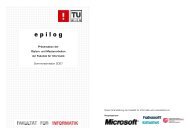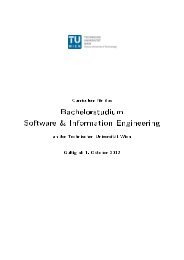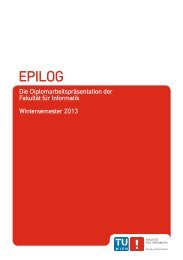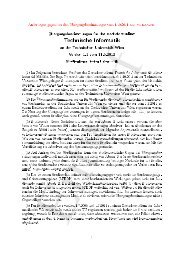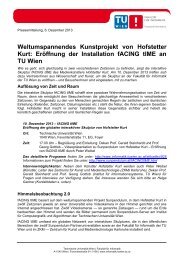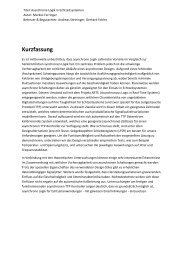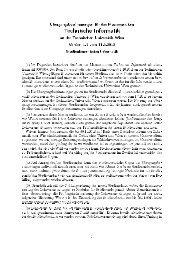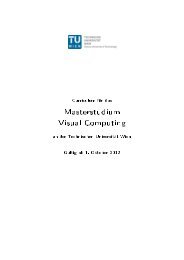Masterstudium Business Informatics - Fakultät für Informatik, TU Wien
Masterstudium Business Informatics - Fakultät für Informatik, TU Wien
Masterstudium Business Informatics - Fakultät für Informatik, TU Wien
You also want an ePaper? Increase the reach of your titles
YUMPU automatically turns print PDFs into web optimized ePapers that Google loves.
mantic Web vision and basic understanding of Semantic Web technologies. The Semantic<br />
Web supports extensive possibilities for automated interrelation and query of information<br />
and processes. In this context Ontology as the building block of Semantic Web will<br />
be introduced and some important properties of ontologies will be discussed. It will be<br />
also shown how ontologies can support varied applications in dierent knowledge domains.<br />
This module also introduces some emerging trends in ontologies and Semantic<br />
Web eld, such as Linked Open Data. Furthermore, Based on the standard formats and<br />
languages such as XML, RDF(S) and OWL, some technologies and tools are presented<br />
that facilitate semi-automatic integration of various data sources. In this module mapping<br />
algorithms and interfaces for semi-automatic alignment of data, based on recent<br />
research results will be introduced.<br />
SBI/KM4 - Semantic <strong>Business</strong> Processes (6.0 Ects) Service oriented techniques<br />
are used for building software applications that use services available in a network such<br />
as the World Wide Web. The driving forces come from both the software engineering<br />
community and the business process community. Service-Oriented Architecture (SOA)<br />
promotes loose coupling between software components so that interoperability across<br />
programming languages and platforms can be achieved. Extending the classic middleware<br />
functions, SOA techniques incorporate the demands of e-business by adding process<br />
modeling and management functions. The description of services covers not only software<br />
interfaces but also semantic business information. Services can be dynamically discovered<br />
and composite services can be built from aggregates of other services.<br />
SBI/LAW - Advanced Aspects of IT-Law (6.0 Ects) This module deals with advanced<br />
legal aspects in applied computer sciences and IT related project and contract issues.<br />
Students adopt a deeper and applied understanding of specic law sectors relevant for<br />
IT professionals in actual project scenarios. Students identify the specic relevance of<br />
certain legal issues in applied IT scenarios. Moreover students gain insight into everyday<br />
situations and are aware of the rights and duties of the parties involved, so that they<br />
may avoid legal drawbacks from the perspective of an IT professional. The majority of<br />
the lessons are held as presentations and discussions involving students. Moreover small<br />
practical exercises are elaborated by each student or in groups.<br />
SBI/MO2 - e-<strong>Business</strong> Modeling (6.0 Ects) This module focuses on model-driven<br />
development of solutions for e-business partnerships. Thereby, the module investigates<br />
on methodologies and techniques on the dierent levels of an e-business partnership and<br />
the integration of these levels: (1) the value perspective manifested by a business model,<br />
(2) the process ow perspective manifested by choreographies among the parties, and<br />
(3) the execution perspective manifested by the deployment artifacts. A lecture series<br />
is accompanied by practical courses where the students have to demonstrate their skills<br />
by presenting solutions for given examples and develop a model-driven solution for a<br />
practical problem spanning all the dierent layers of inter-organizational systems for<br />
e-business.<br />
SBI/MTE - <strong>Business</strong> <strong>Informatics</strong>: Methods and Techniques for e-Marketing<br />
(6.0 Ects) This module focuses on the technological as well as methodological aspects<br />
15




